
Atlas F1 GP Editor
Rated as one of the best drivers in Formula One today, Giancarlo Fisichella may finally have a competitive car next season, when he returns to the team he left three years ago. But Benetton are now Renault, and Fisichella is now a Grand Prix winner. Renault are now built around Fernando Alonso, and Fisichella has so far blown away every teammate he had. How will the reunion pan out? And how did Fisichella change in the three years away? David Cameron talked to two of the men who worked with Fisichella the longest, as well as interviewed the Italian himself. Exclusive for Atlas F1
Plugging away nonetheless, Fisichella has come through this year's Silly Season on top – a drive with the renamed Renault team is seen as just reward for eight years of solid driving – not a traditional top three team, perhaps, but inevitably this year will give the team that result in the Championship.
But how good is the man who, in 2002, was the first driver chosen by his peers as the best of the bunch? Is Fisichella all hype or the real deal? Two men who know the answers better than most are Gary Anderson and Mike Gascoyne. Anderson was the Technical Director for Jordan for both of Fisichella's spells with the team, in 1997 and 2002/03, and Gascoyne filled the same role for Benetton. Both men are known for their outspoken nature, and had a lot to say about the diminutive driver.
DC: Gary, when Fisichella came to Jordan in 1997 what was he like, and what were his technical abilities like then?
Gary Anderson: "It's like anything – he was new, and he drove the car using his talent to the best of his ability, so I think he'd be quick when everything was good, and sometimes he could come out of not being so good, but you needed a bit of luck on your side – inexperience means you need a bit of luck to find the right things. Now he had good technical feedback, but from limited experience - it was as good a technical feedback as you can expect from a new driver.
"He came to us in 1997 with Ralf - Ralf was fresh, and Fisi was after only a year at Minardi, so they were both very inexperienced at the time. Fisi was a very, very talented guy, and we had some great races – we probably should have had a few more good races except that both of our drivers were inexperienced and for all the talk, experience counts. We made a few mistakes ourselves – you don't like to think that you're inexperienced after six years, but you are. I think the season was pretty good, with the Peugeot engine and a good car, and in general the two of them were always fighting each other.
DC: Mike, how were Fisichella's technical abilities as a driver by the time he got to Benetton?
Mike Gascoyne: "I think the year I worked with him (2001) he did an absolutely superb job for Benetton - he had a reputation perhaps of being a little bit lazy and a little bit inconsistent, although very, very quick. I have to say, at the start of the year the car wasn't very good but he drove fantastically; he is a very talented driver. But his work ethic was also good - he never let his head go down. The sort of reputation he had was that if his head went down he'd get a little lazy, and I think that since 2001 he worked fantastically hard and when the car got better then bang, he was there to take advantage of it.
"I think the other thing is that he's since proven - and he's had some frustrating years at Jordan and then Sauber - is that he's blown all of his teammates away, he's done it consistently, and he's done a similar job, kept his head up and smiled. I really worried when he went to Sauber last year actually - the first two or three races I think Massa had the better of him, and you really wondered had the last two years at Jordan knocked the edge off, had he just lost the spark, and the first few races when Massa beat him you thought 'hmm', but he's then done a great job for Sauber as well.
"So I think he's a lovely guy, very like Jarno [Trulli] in some respects – a very unpolitical, nice guy – and I think the one thing about him as a driver is that whenever he gets into the car and he drives a lap, that's as quick as it goes. If you make the car two tenths quicker he gets in it, puts another set of tyres on, and it goes two tenths quicker, if you make it two tenths slower he gets in and goes two tenths slower. So he's instantly on it, he doesn't have to build up to it or say 'well yeah the lap time was slower, but I feel...' – bang, he's just there. And I think that's very nice to work with as an engineer, because you just look at the stopwatch and there it is, that's what it is. Very uncomplicated, very nice guy, and I'm glad to see him get his chance back at Renault because I think he deserves it."
DC: Gary, when he came back to Jordan after being at Benetton did you see any difference in him, in his technical abilities?
"Austria (2002) was a pretty good example – I think we qualified 12th or 13th or something, and we were driving around 12th or 13th, but because of Takuma Sato's accident we got the pace car, got him fuelled up, and suddenly we were in fifth and he was driving around at the pace of everyone around him – if you slot him in somewhere, he can cope with it, which is excellent, and you can't ask for much more than that. Then it's up to the team to provide the tools for slotting yourself in there. And again in Brazil (2003) it was wet and stuff, and people were falling off the road, but he didn't – at the end of the day it might have been a lucky win, but you make your own luck as well, you know.
"If you can give him an opportunity he'll do a very good job, and he's very, very consistent, drives the car really well with a lot of finesse – at tracks like Monza and Hockenheim as it was we obviously run with no downforce, and they need a lot of finesse because they're running with very low downforce in slow speed corners – and he's really, really got that feeling. He drives the car nicely, he's good to the car and tells it what he wants from it and the car responds. If you give him the tools, he can do the job."
DC: There must have been a difference in expectation from when he joined Jordan in 1997 and when he returned; in 1997 he was a young guy, inexperienced, but when he came back you must have looked at him as a more seasoned professional.
Anderson: "1997 was a big year for us, to be honest, because you go up and down, and you're limited by budget – budget limits the people you have – and because you're limited with people you're limited with experience and expertise. So you sort of go up and down with the flow. If you get it right, you get it right; but if you're a big team with lots of money you've sort of got a surplus of good people all bouncing off each other, and you take away the humps and hollows a bit, you smooth it out a little bit.
"But he really hadn't changed that much, except he had a bit more experience. With Fisi and Jordan in 1997 - I wouldn't just say Fisi - you'd never quite have known if you were going to a race and were going to be competitive. with Fisi in 2002 and 2003 he was at a level, and if we went up and down it was because of us. So you take that as an equation, and that's what you need to do – as a driver you just build on his ability to get the best out of a car as possible and not try to take too much out of the car. Because you can, if you drive a car at its limit - inexperienced drivers can possibly over-drive, and in 1997 we suffered a bit of that.
"We'd had some of the old hardened guys in the car and thought Jesus, getting up in the morning and finding the motivation for that can be pretty difficult, so for me - give me a young driver any time, someone you can try to work with. He's not out there trying to drive a Williams, he's trying to drive the car he's got, because he's not got that depth of experience. We only know the car we built, and he only knows the car he's driving, and just gets on with it. That was the goodness of 1997 for us, that was the thing that motivated the team, and in 2002 that was the thing he brought back to us, that was the thing he carried, and he never ever once sat in the car and said 'the Renault did this, the Renault did that'."
DC: Mike, how do you rate Fisichella for his technical feedback, for his work with the engineers?
Gascoyne: "I think certainly the year I worked with him he was very good – he worked hard in the tests, he stayed with the team and so on. I wouldn't say he's the most technical of drivers – he's a sort of 'give me a halfway decent balance and I'll get out there and drive it as well as it can be driven' sort of thing – he's not one to pour over the data for hours or go into the technical side of it as some drivers are, he's a little bit more seat of the pants if you like. But he has the talent to do that, and I think going back to Renault he'll have an engineering team that will know him very well, and who know how to get the best out of him, and I'm sure they will get the best out of him."
DC: Gary, what is Fisichella's biggest strength?
DC: Fisichella has this obvious natural talent, and Fernando Alonso is the same, but I wonder if they maybe coast a bit on that rather than taking that as a base and grafting away from there.
Anderson: "I agree 100% with you – I think one thing you can say about Michael Schumacher, and he is the best of the best, is that he does both. Michael has got the natural talent, but he does work at it, he is physically fit, he does motivate the team, he does work with them, he is there, he motivates his mind, he is mentally fit as well as physically fit - there are a lot of pieces to the jigsaw, and the guy who has the most pieces can build the jigsaw, and Michael's got most of the pieces.
"The problem with a lot of the drivers is, I think, their attitude. They think that being a motor racing driver is better than working, and you don't have to put that much into it if you've got natural talent. So you've got to be careful because it's a hard world out there."
DC: Mike, people have mentioned previously that Fisichella's not the kind of guy who is going to have a massive part in pushing the car forward, or pushing the engineers forward.
Gascoyne: "No, but I think he does it in a different way – he drives it as quick as it can go, and it's your job to give it to him, so he's not there pushing you to change the car and improve it and work on it from that point of view, but the fact that you know that you have a guy there who can do that pushes the team on, because if you know that if you are two tenths behind and in P4 that if you can make it two tenths faster he'll then go in front of him. He's not one of those guys in the team that is pushy, who says I need this and I need that, but he's sort of 'make it halfway decent and I'll do the job for you' – he's that sort of approach.
"I've always laughed when someone says a driver comes to the team and he'll push them and make them work harder – well fuck me, they ought to be working hard as it is, and they shouldn't need that. Drivers aren't around long enough to do that, they're not here all day, they're not here at ten o'clock at night, and quite rightly they shouldn't be, but there should be someone here who is doing all of that so I've never really seen why you need all of that from a driver – what you need is someone who can drive it as quick as it can go."
DC: There's a feeling in Formula One these days that the days of a driver who comes along, jumps in the car and goes quick and then gets out and goes home are over – Williams's Sam Michael, for one, believes that the drivers have got to get in with the teams, with the engineers...
Gascoyne: "I think Sam's right, and ultimately if a guy is just quick, well, I think there will be guys who can just do that, but in Formula One now it's such a complete thing – you've got to do all the media work, the engineers need you, you've got to do all the briefings, you can't just get out of the car, smoke a fag and say 'you guys fix it', because the engineers need all the information. You've then got to go to the press conferences, you've got to go up to the Paddock Club, you've got to go and see the sponsors, you've got to go and see Mr. Toyota or whatever - so you've got to be able to do all of that, and if you can't you're not going to be the complete Formula One driver, because there are guys out there who are just as quick as you who can do that, and therefore they're going to win.
"If you look at Michael Schumacher, he's very successful because he's the complete Formula One driver. So I do think ultimately if you just drive it quick then that's all I need, but we need so much information to ensure that they have the quickest car - there's an element that they've got to be able to do the debriefs, they've got to make sets, they've got to not talk crap, they've got to say the right things, they've got to understand the telemetry, they've got to be able to feel the tyres, and they've got to be able to debrief all of that information. So if you get guys who can't do all of that, no matter how talented they are, you're not going to end up with a car that's quick enough."
DC: Gary, you've mentioned before that Fisichella was next to impossible to get to the factory
"And he's right, but it doesn't carry that weight with the guys back in the factory who want to hear his voice – they don't just want to hear it from me, I'm just a middle man there, and am I saying it my way or am I saying it his way? You need to come sometimes, and just chat that stuff through with them and they get a bit of inspiration."
DC: We'll have to see if Renault can do that to Fisi...
Anderson: "Well that's the thing – he's going back to Renault and the same regime, whereas if he'd have gone to Williams, it would have been expected of him, and now that's gone. Can Renault change that? Can Renault go through their managerial and operations changes? It's bloody difficult."
DC: Mike, Fisichella's never really had a top drive in Formula One, and there's always been this question about why hasn't he been given a Ferrari drive, a Williams drive, a McLaren drive – do you think it's this complete package perception?
Gascoyne: "Well no, because I think in 2001 all of us in the team would have loved to have kept him but contracts were done. I think I'd love to see him do well next year – if I was still at Renault I'd be supporting the fact that he's going there, but having said that I'd also have supported having kept Jarno because he's done a great job for them this year as well, and that only really became destabilised since it all changed, for the inevitable reasons of Mr. Briatore! But I'm sure Fisi will do a great job, and it'll be nice to see."
DC: You know Renault inside and out, you know what they are, you know what they've been, you know what they've lost or are losing for next year, you also know what they are gaining with Fisi. They've got all the budget, they've got all the resources and everything else – so what is Fisi going to do next year?
"John Iley, an aerodynamicist there, has left for Ferrari, and I rate him superbly highly, and Mark Smith has left, and he's a designer that I rated, and both of them I brought to Renault. Dino (Toso), who took over from John, is very good but has been unwell and hopefully is recovering, Mark's gone and they've still got Tim (Denham – joint chief designer with Smith) but they'll miss out on the work that Mark would be doing. So they've got good strength in depth, and with Bob organising them they'll work in the right way, and I'm sure that they're strong, I have no doubt about that.
"You win in this business ultimately by engineering stability – look at Ferrari, look at McLaren in the late eighties, look at Williams in the nineties. When those teams broke up they lost. Now they (Renault) have lost a couple of key people. Having said that, they do have strength in depth, so it is a key time for them. They're losing Jarno, they're gaining Fisi – I think that's probably... I think Jarno is one of the quickest guys out there, Fisi's pretty close, Fisi's probably a more consistent racer – so I think that's just about a straight swap, there are some pluses and minuses. The key is whether they've kept the engineering stability with all of the changes that they've had, but Bob's still there, Tim Denham's still there, there are a lot of good people still there, so I wish him well."
DC: Gary, is returning to Renault a good move for Fisichella?
Anderson: "I think from my point of view Renault's changing a bit, and he needs to be a little careful that it doesn't change for the worse – a few people are moving here and there. He drove for us, and he drove for Renault, before, and if you go back to the same team again you don't really bring another sort of viewpoint, so he's going back to a team that's got its viewpoint that he learned from, and it doesn't strengthen the team by bringing in something else, whereas let's say he'd gone to Williams, he's never been to Williams and they've got their attitudes, he's driven for Sauber, Jordan, Renault and Jordan in his earlier career and have gone to another team – it would have added to what the mix is, so if I'd have been his advisor I'd have said Williams is a good spot, a good opportunity, and Renault could be in a little bit of trouble itself, and you don't really strengthen it."
DC: Mike, Renault have been very much built around Alonso, especially now with Jarno going – how's Fisichella going to deal with that?
DC: And they've got very different driving styles – Alonso's a bit more of a monster in the car, whereas Fisichella's much smoother. If they're going to build a car to Fernando's strengths...
Gascoyne: "I don't think they'll do that – I think they'll build a car from the wind tunnel, and if they work in the way that I set up, and I'm sure they will be, then that's not an issue at all."
DC: Gary, all things considered, what are your expectations of Fisichella for next year?
Anderson: "I think Alonso, watching him and watching him drive, is a very aggressive driver – he's a fairly brutal driver, really, with the car. Maybe the car needs that, maybe the car doesn't need that, I don't know. Fisi, on the other hand, has a lot of finesse – he's good to the car, tells the car what he wants from it. And again it depends on the design philosophy; Trulli is quite an aggressive driver as well, and he's always been a good one lap man which shows up an aggressive driver, because it's hard to do that all the time. So I think the car has evolved along the path that the guys have set, so if they get some time on it, that means an aggressive driver can pull it out of it, but it doesn't look like a finesse kind of car where you have to keep it on line and neat and tidy to drive it.
"I hope Fisichella can do a solid job – I think Alonso is quite good, and as you say the team has been built around him and the car's mentality has been built a bit around him, and also it's going to be his third year there, so the team itself is bent a bit in the direction that suits him, because that's who they've got. And I think Fisi's a bit the other way – he's a quick driver, but he's not an aggressive driver. He likes to play with the car, feel the car and drive the car, and as I say Alonso is quick so I think it's going to be his biggest measure yet to see what happens - he went to Renault with Jenson Button and he knocked Button over, but he had a lot of experience and Button had fairly little.
"I wouldn't know what to say there, to be honest. I rate Fisichella as high as... well, Michael's out there on his own, but I rate Fisi as high as anyone else as a driver personally - and in the right environment I'd rate him as excellent. But it's very easy to drop once the environment does, and then you don't get the best out of him. But as I say, the way the team is built to Alonso, and they've now dropped a little bit after coming through strong - and I'm not sure how far it's going to fall.
"I just really, really hope he's not at the wrong place at the wrong time again – that would do my head in if he is!"
DC: Back in 1997, you went to Jordan after most of a year at Minardi – what sort of technical abilities do you think you had then compared to now? What were your strengths and weaknesses?
Giancarlo Fisichella: "Well I am obviously much more consistent, I have much more experience, I can jump in the car and go flat out on the first lap, I can understand the behaviour of the car much earlier – obviously you need experience for that, and I have eight years of experience and feel confident, comfortable."
DC: Yes, but what do you remember from that period? You've obviously changed a lot since that time – do you now look back and say 'I thought I knew a lot, but now I realise it was not so much' or do you think you've stayed the same over the years?
Fisichella: "I think my speed is very similar as a few years ago, and I told you I have more experience, I can drive in the race more consistently, without mistakes and very quick – a few years ago it was a bit more difficult to do that, and I am even much more stronger now, physically and mentally. It's very important to spend a lot of time with the engineers to improve the car and the set up and everything – it's very important to understand the behaviour of the car. But obviously the engineers have the job to improve the car."
DC: When you went to Benetton, do you think you learnt a lot more moving from one team to another on a technical level?
Fisichella: "Yeah, yeah, I learn a bit more, especially when you work with people with a lot of experience like Pat Symonds, Gary Anderson, so when you have a good engineer you can see, you can learn a lot from the car."
DC: What were the main differences that you noticed between the teams moving from Jordan to Benetton and then back to Jordan?
Fisichella: "Well, not a big difference. Unfortunately when I went back to Jordan the team lost a lot of sponsors, and the budget was very poor, so the car was not good at all, was not developed during the year, and it was quite difficult – we lost lots of people in the factory. It wasn't so easy."
DC: Gary Anderson was wondering if maybe a move to Williams would have been better for you, because you would be going to a different team with a different way of working, whereas by going back to Renault you might just go back to the way things were done there before...
Fisichella: "We'll see next year, but I think Renault has a very good potential – they are now quicker than Williams – and it's important to move to a new team and have straight away a good feeling. I know most of the people at Renault, so it's going to be easier at the start of the season."
DC: How do you think you are going to fit into a team that, although you used to work there, have been pretty much molded around Alonso?
Fisichella: "Okay, I think if they make a good car I'll have the same opportunity as Alonso to do well."
DC: Alonso is a very aggressive driver whereas you are a very smooth driver. Do you think that will make a difference?
Fisichella: "I don't know – I can't tell you now – it depends on the characteristics of the car. But I am very, very confident and optimistic for next year."
DC: "Finally, on a technical level, how do you rate your year at Sauber? What do you think you've picked up from being here this year?"
Fisichella: "I think I did very well – I did my best, we did very good in the development considering the work we did in the track in testing. They do lots of work now in the windtunnel, but we don't do a lot of testing, and we went in the right direction. I think I did my best – we are quite happy."
Giancarlo Fisichella is an enigma. Coming into the sport with Minardi in 1996, when the team were still able to provide a real springboard up the grid, he proved his merit sufficiently to earn a drive with Jordan for the following year. The team was on the up after a spectacular debut, the inevitable sophomore slump and a steady improvement, and there was a real feeling of ability surrounding the team for the 1997 season where, paired with the debuting Ralf Schumacher, Jordan were able to claim podiums and challenge, albeit unsuccessfully, for wins.
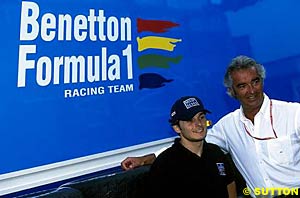 Flavio Briatore, a man with a nose for talent, came calling, sweet talking the talented Italian driver into a contract with Benetton. The period was a roller coaster ride in terms of results, but throughout no one in the paddock blamed the pilot for the mess the team was in. Nevertheless a drive with one of the top three teams failed to materialise, and Fisichella found himself returning to his old stomping ground at Jordan, then in decline since a spectacular year in 1999. The homecoming was eventful, with the driver finally claiming a somewhat fortuitous win in an action packed Brazilian Grand Prix, but little else in the way of results.
Flavio Briatore, a man with a nose for talent, came calling, sweet talking the talented Italian driver into a contract with Benetton. The period was a roller coaster ride in terms of results, but throughout no one in the paddock blamed the pilot for the mess the team was in. Nevertheless a drive with one of the top three teams failed to materialise, and Fisichella found himself returning to his old stomping ground at Jordan, then in decline since a spectacular year in 1999. The homecoming was eventful, with the driver finally claiming a somewhat fortuitous win in an action packed Brazilian Grand Prix, but little else in the way of results.
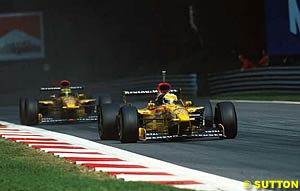 "But if you look at our season it was pretty stable – we were, I think, two hundredths of a second off pole at Hockenheim and nearly won the race, or at least nearly came second when the tyre went; in Argentina he and Ralf came together and Ralf ended up third; and I think Fisi went on to finish second at Montreal and third at Spa. They were good, solid results, and from the experience he had, his technical feedback was excellent - you can't expect more than that, you know. And Ralf, to be honest, was the same – both of them would say now that they had a good year, and if only they knew what they know now we'd have been in a very, very competitive position. That's life."
"But if you look at our season it was pretty stable – we were, I think, two hundredths of a second off pole at Hockenheim and nearly won the race, or at least nearly came second when the tyre went; in Argentina he and Ralf came together and Ralf ended up third; and I think Fisi went on to finish second at Montreal and third at Spa. They were good, solid results, and from the experience he had, his technical feedback was excellent - you can't expect more than that, you know. And Ralf, to be honest, was the same – both of them would say now that they had a good year, and if only they knew what they know now we'd have been in a very, very competitive position. That's life."
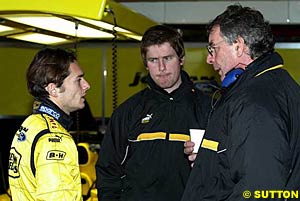 Anderson: "Yeah, obviously his feedback and approach was much more stable – he'd lost a lot of the sort of Italian emotion they talk about, because he'd had the corners knocked off it a bit. His feedback was from an experienced point of view, and what he kept was the youthfulness and momentum, and the motivation he gave for the rest of the team. He was still there to do the job, but he wasn't a hardened old Formula One driver like some of them are, wandering around and you can see it. Now obviously Jordan didn't have good seasons in 2002 and 2003, for loads of reasons, no individual one reason, but whenever we gave him an opportunity he picked it up and got on with it, which is quite good really - at that time we probably bought a lottery ticket more often than we should do, but we didn't have a chance of doing well if we didn't.
Anderson: "Yeah, obviously his feedback and approach was much more stable – he'd lost a lot of the sort of Italian emotion they talk about, because he'd had the corners knocked off it a bit. His feedback was from an experienced point of view, and what he kept was the youthfulness and momentum, and the motivation he gave for the rest of the team. He was still there to do the job, but he wasn't a hardened old Formula One driver like some of them are, wandering around and you can see it. Now obviously Jordan didn't have good seasons in 2002 and 2003, for loads of reasons, no individual one reason, but whenever we gave him an opportunity he picked it up and got on with it, which is quite good really - at that time we probably bought a lottery ticket more often than we should do, but we didn't have a chance of doing well if we didn't.
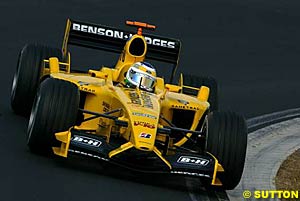 "We weren't in that position, but in 1997 we put a huge effort into the car, and with young drivers coming in. I'm personally a young drivers' man – it's great to see two young drivers together because yeah, they'll make a few mistakes and end up in a few gravel traps probably, but they're out there driving the wheels off it.
"We weren't in that position, but in 1997 we put a huge effort into the car, and with young drivers coming in. I'm personally a young drivers' man – it's great to see two young drivers together because yeah, they'll make a few mistakes and end up in a few gravel traps probably, but they're out there driving the wheels off it.
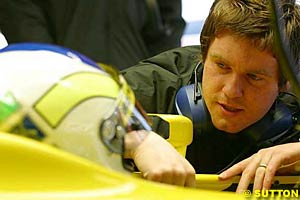 Anderson: "I think he carried that sort of youthful, talented thing - it was a different sort of level, you know, but not difficult to work with. I think through his career he has carried that sort of youthfulness with him, even though he's got a lot older and a lot more experience. He now knows what's required to be up the front, and he still carries that youthfulness with him, he keeps his enthusiasm and he's a nice guy to work with. Rob Smedley, his engineer, and he worked together really well, and I suppose Fisichella's biggest thing was to give him motivation – everybody feels that they don't get demotivated but you do, and you're the last person to realise that yourself, probably."
Anderson: "I think he carried that sort of youthful, talented thing - it was a different sort of level, you know, but not difficult to work with. I think through his career he has carried that sort of youthfulness with him, even though he's got a lot older and a lot more experience. He now knows what's required to be up the front, and he still carries that youthfulness with him, he keeps his enthusiasm and he's a nice guy to work with. Rob Smedley, his engineer, and he worked together really well, and I suppose Fisichella's biggest thing was to give him motivation – everybody feels that they don't get demotivated but you do, and you're the last person to realise that yourself, probably."
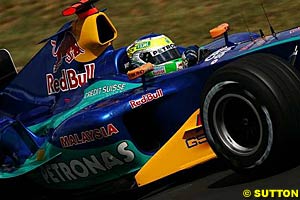 "I inherently feel you don't need a driver to push the engineering team because it's my job to do that – we're doing everything flat out for them – what you want is someone who, when you've done a good job, goes out and hauls the shit out of it, and Fisi can do that. I think drivers can push teams, but ultimately they shouldn't need to – they should be pushed by the organisation that's in place to do the job.
"I inherently feel you don't need a driver to push the engineering team because it's my job to do that – we're doing everything flat out for them – what you want is someone who, when you've done a good job, goes out and hauls the shit out of it, and Fisi can do that. I think drivers can push teams, but ultimately they shouldn't need to – they should be pushed by the organisation that's in place to do the job.
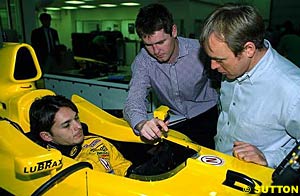 Anderson: "Yeah, he's very distant from all that stuff, you know – you would have to ask him to come, and he'd find reasons not to. It's probably because he lives in Rome and we're in England, so it's not like you're driving around the corner. But as a team of people, it's the guys back at the factory that never see the drivers, and need that motivation from them. Fisi is one of those in the pitlane who visit the factory maybe twice a year – the British Grand Prix and a Silverstone test probably. If you were going to make it every month, say one Monday every month we're going to be at the factory for a day's work, an engineers meeting and blah blah blah, get it all thrashed out, he'd say 'well couldn't we do it at the track before a race meeting?'
Anderson: "Yeah, he's very distant from all that stuff, you know – you would have to ask him to come, and he'd find reasons not to. It's probably because he lives in Rome and we're in England, so it's not like you're driving around the corner. But as a team of people, it's the guys back at the factory that never see the drivers, and need that motivation from them. Fisi is one of those in the pitlane who visit the factory maybe twice a year – the British Grand Prix and a Silverstone test probably. If you were going to make it every month, say one Monday every month we're going to be at the factory for a day's work, an engineers meeting and blah blah blah, get it all thrashed out, he'd say 'well couldn't we do it at the track before a race meeting?'
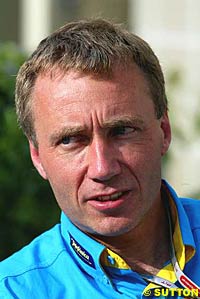 Gascoyne: "I think he'll be capable of winning races – one of the things I think I did very well and very professionally for Renault was leave them with a very good organisation of staff and very good people, so that they probably didn't need me in some respects! And Bob Bell, who was my Deputy Technical Director [and is now the Technical Director], is one of the guys I probably rate highest in the pitlane. With him taking over for sure they were going to stay at a very high level, so I had no doubts they'd do that this year.
Gascoyne: "I think he'll be capable of winning races – one of the things I think I did very well and very professionally for Renault was leave them with a very good organisation of staff and very good people, so that they probably didn't need me in some respects! And Bob Bell, who was my Deputy Technical Director [and is now the Technical Director], is one of the guys I probably rate highest in the pitlane. With him taking over for sure they were going to stay at a very high level, so I had no doubts they'd do that this year.
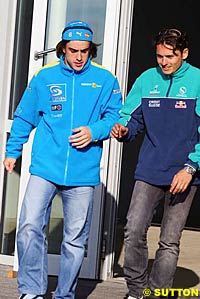 Gascoyne: "I think Fisi's race engineer will be his old race engineer from when he was there several years ago - Alan Permane, who was Jarno's race engineer this season and was Fisi's for several years before that. So I think he'll be very comfortable within the team. Fernando's an easy guy to get along with as well, so I don't think that'll be an issue at all."
Gascoyne: "I think Fisi's race engineer will be his old race engineer from when he was there several years ago - Alan Permane, who was Jarno's race engineer this season and was Fisi's for several years before that. So I think he'll be very comfortable within the team. Fernando's an easy guy to get along with as well, so I don't think that'll be an issue at all."
Giancarlo Fisichella: In his Own Words
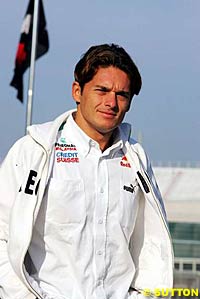 Giancarlo Fisichella has been waiting for this moment for his entire career. With a Renault contract for next season safely in his pocket he looks at his past teams, his abilities, and his plans to take on the incumbent and to push the team to new glories.
Giancarlo Fisichella has been waiting for this moment for his entire career. With a Renault contract for next season safely in his pocket he looks at his past teams, his abilities, and his plans to take on the incumbent and to push the team to new glories.
|
Contact the Author Contact the Editor |
Please Contact Us for permission to republish this or any other material from Atlas F1.
|
Volume 10, Issue 40
Articles
Interview with Giancarlo Fisichella
Sayonara Oli
2004 Japanese GP Preview
2004 Japanese GP Preview
Japanese GP Facts & Stats
Columns
The F1 Trivia Quiz
Bookworm Critique
On the Road
Elsewhere in Racing
The Weekly Grapevine
> Homepage |